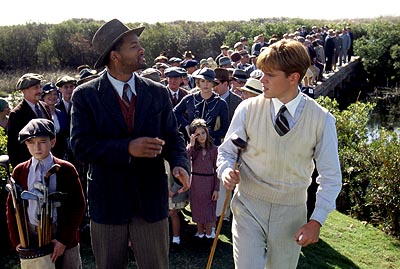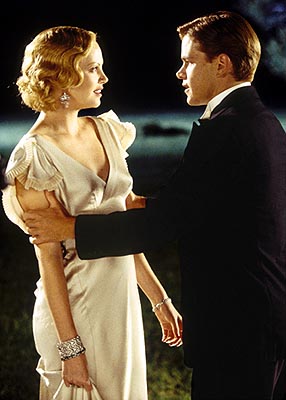

It is hard not to like The Legend of Bagger Vance, but it may be hard to really like it. Based on Steven Pressfield's novel of the same name, Bagger Vance is another exercise in old-fashioned filmmaking for director Robert Redford. This movie has many of the same qualities as The Horse Whisperer plays extremely similar to A River Runs Through It. Now, instead of fly-fishing, the protagonist uses golf as a means of a near spiritual self-discovery. Everything is so genteel and laid back that it is easy to lose oneself in Redford's love of scenery and ambience. But sometimes, things are so calm that any sense of tension fades slowly into the green. But again, The Legend of Bagger Vance may not be completely about winning or losing, it is about reconnecting with oneself.
Before World War I, Rannulph Junuh (Matt Damon, The Talented Mr. Ripley, Dogma) was an up and coming golfer, winning nearly every tournament in the South. He lost his entire company in the war (Redford covers this in about a minute) and loses all hope back at home. He sits at home, drinks, and claims he "lost his swing." He abandoned a relationship with Adele Invergordon (Charlize Theron, Men of Honor, The Yards), the daughter of a local businessman. He spent all his money building a golf course, only to have the Great Depression strike after its completion. In order to bring some business in, Invergordon arranges an exhibition match between legendary golfers Bobby Jones and Walter Hagen, but local officials insist on having a local also play. Precocious kid Hardy Greaves (J. Michael Moncrief) convinces Junuh to play. That's when Bagger Vance (Will Smith, Wild Wild West, Men in Black) shows up, literally out of nowhere.
Vance's character is as charming as he is frustrating. Jeremy Leven's (Don Juan DeMarco) script makes no attempt to examine Vance's character. Instead, he merely spouts happy existential sayings at every opportunity like a new age guru. He really has no depth, yet seems to know how to get under Junuh's skin and zero in on a problem. Vance becomes Junuh's caddy and his spiritual advisor. Junuh's golf game and his life are one and the same. Improve one and the other improves also. The game of golf serves as a metaphor for life. Clouds roll by quickly, and people disappear as Junuh focuses intently on the fairway. The other characters are similarly simplistic in their mannerisms. There is not much context to Junuh's condition. Sure he lost all his men, but he seems more in a rut than deeply depresses. The performances are fine, it is just a matter of not having much to perform with.
But again, it is not the game that matters, and in a way, the story doesn't matter either. It is all about the atmosphere. Redford has a gifted eye for scenery, and shoots everything with a pastoral feel. Composer Rachel Portman delivered a near-mushy sentimental Oscar nominated score for The Cider House Rules, and does so here also. The music is full of strings and light on some of the louder horns, and soars with emotion every time Junuh whacks the ball. And the depression does not even seem to faze Redford's Savannah. Granted, much of the story takes place on the golf course. The entire atmosphere is almost that of an adult fairy tale, where believing in oneself can make everything better. It's nice to watch, but would be nicer if there was a little more substance.